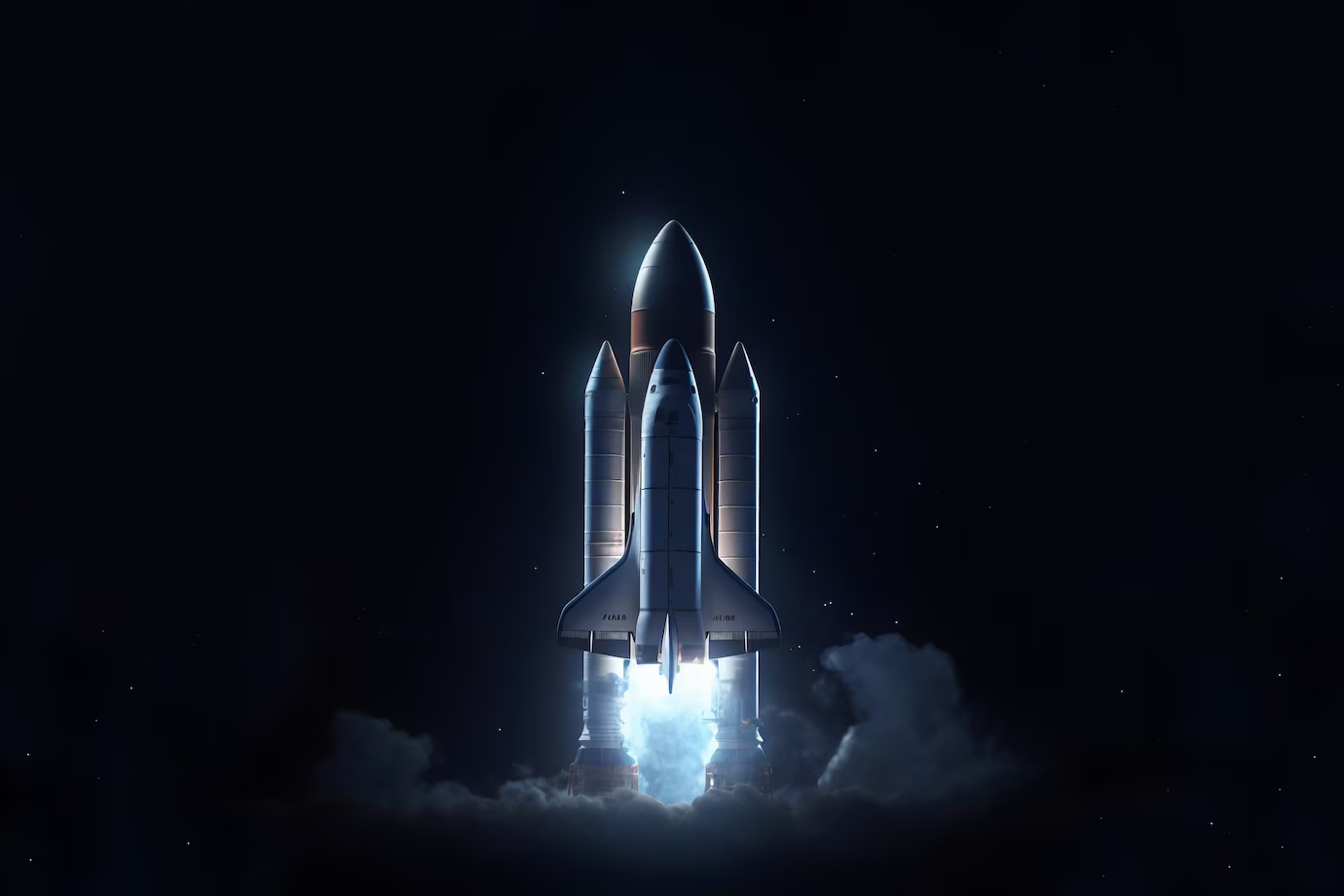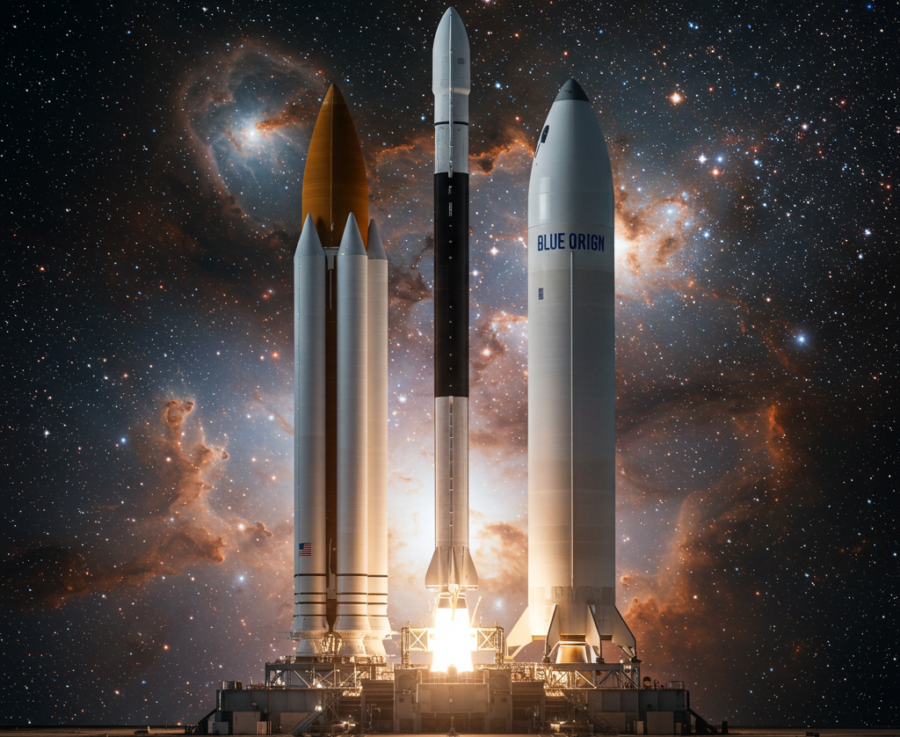The 21st-century space race is no longer a duel between superpowers like the U.S. and the Soviet Union. Instead, it’s a high-stakes battle between billionaires. At the forefront of this new space frontier are two dominant forces, Elon Musk’s SpaceX and Jeff Bezos’s Blue Origin. These two private aerospace companies have transformed the way we think about space exploration, from a government-dominated endeavor to an arena for private ambition, innovation, and control. But in this cosmic competition, a very important question looms: Who becomes the first true “owner” of the space?

The Visionaries: Elon Musk vs. Jeff Bezos
At the heart of each company is a distinct, driven personality with an ambitious vision for space. On one hand, Elon Musk founded SpaceX in 2002 with the explicit goal of making humans a multiplanetary species. His dream? Colonizing Mars and ensuring humanity’s survival in the event of a catastrophe on Earth. On the other hand, Jeff Bezos launched Blue Origin in 2000, inspired by a long-standing passion for space. His goal is to build infrastructure that enables millions of people to live and work in space, envisioning a future of floating habitats and off-Earth industry. While both men aim to expand humanity’s presence beyond Earth, their methods, philosophies, and timelines differ dramatically.
Technological Showdown: Rockets and Reusability
SpaceX revolutionized spaceflight with the Falcon 9, the first orbital-class rocket capable of being reused. It didn’t just land, it stuck the landing, literally bringing costs down dramatically. The company also developed the Falcon Heavy and, more recently, Starship, a fully reusable spacecraft designed for interplanetary missions. SpaceX also became the first private company to send astronauts to the International Space Station aboard the Crew Dragon capsule in 2020. The company’s ambition is to go to other planets, and for that, the Starship is designed to carry 100+ passengers and significant cargo to the Moon, Mars, and beyond.
Blue Origin has moved slower, focusing heavily on testing and gradual progress. Its suborbital rocket, New Shepard, is used primarily for space tourism. However, its upcoming New Glenn orbital rocket and Blue Moon lunar lander show more ambition. In 2021, Blue Origin launched its first crewed suborbital flight , sending Jeff Bezos and others to the edge of space. Blue Origin’s long-term focus is building infrastructure, such as space stations and lunar landers, that will support human expansion off Earth.
SpaceX is ahead in launch cadence, reusability, and interplanetary ambitions. But Blue Origin argues that slow and steady will build the more sustainable future.
Funding Models: Public vs. Private Funding
SpaceX has secured billions in contracts from NASA and the U.S. Department of Defense, including NASA’s commercial crew program, the Human Landing System for Artemis missions on the Moon, and launch services for Starlink and global communications. SpaceX also funds itself through Starlink, its rapidly growing satellite internet service. With thousands of satellites in orbit, Starlink is both a revenue generator and part of Musk’s broader space control strategy.
Blue Origin was primarily founded by Jeff Bezos himself, who sells billions in Amazon stock annually to support the venture. While it has some NASA contracts, such as its own version of a lunar lander, Blue Origin lacks the aggressive, diverse funding model that SpaceX has built.
Moon and Mars: Who Gets There First?
In 2021, SpaceX won the contract to build the lunar lander for NASA’s Artemis III mission, which aims to return astronauts to the Moon by 2025 or later. Blue Origin contested the decision but later received a separate contract for future missions. This makes SpaceX the frontrunner for landing the next humans on the Moon.
While Blue Origin has yet to detail a clear Mars timeline, SpaceX has boldly claimed it could land humans on Mars by the early 2030s using Starship. Whether that’s feasible is debated, but the intent is clear: Musk wants Mars, and he wants it first.
Space Tourism: Ego Trips or Economic Seeds?
SpaceX has launched private citizens into orbital space with missions like Inspiration 4 and is planning ambitious trips around the Moon. These missions aren’t just joyrides, they prove viability for long-term human spaceflight.
Blue Origin has focused on suborbital flights, offering a few minutes of weightlessness and spectacular views. Celebrities like William Shatner and Michael Strahan have flown, but critics argue the impact is more promotional than practical. In terms of depth and utility, SpaceX has offered more advanced and meaningful missions. Blue Origin’s tourism model, however, could fund future development.
Legal and Ethical Questions: Who Owns Space?
Neither SpaceX nor Blue Origin owns space yet. But by operating so extensively in orbit and beyond, they’re shaping the rules of engagement. The Outer Space Treaty of 1967 declares that space is “the province of all mankind” and cannot be claimed by nations. But what about private companies? Current international law is vague on the rights of corporations in space. While SpaceX is deploying thousands of satellites, prompting concerns about orbital congestion, Blue Origin argues for careful regulation and infrastructure before expansion.
As both companies make land claims on the Moon or Mars, questions of ownership and sovereignty will intensify. Will Elon Musk’s Mars colony recognize Earth law? Will Blue Origin build the first space nation? These are no longer science fiction, they are legal debates in the making.
Public Perception and Cultural Impact
The cultural impact of this rivalry can’t be overstated. SpaceX has already reshaped how the public views spaceflight. The company has become synonymous with innovation and excitement, thanks in large part to its public engagement and spectacular launch visuals. Its high-definition live streams, spectacular booster landings, and charismatic CEO have galvanized public imagination. The Falcon 9 and Starship launches feel like events, bringing the excitement of the Apollo era into the YouTube age.
Blue Origin, despite its technical accomplishments, has struggled to attract similar attention or loyalty from the public. The branding war is as real as the technological one. Though often seen as lagging behind, Blue Origin is well-capitalized and is laying the groundwork for a significant future role in space. The development of the BE-4 engine, the upcoming New Glenn rocket, and lunar partnerships with NASA could all pay off in the long run.

So, What’s the Conclusion?
The race is not only about hardware, technology, or ambition, it’s about shaping the future of humanity beyond Earth. Whether we become a multiplanetary species hurtling toward Mars or a spacefaring civilization building orbital habitats and lunar factories, the foundations are being laid now. SpaceX and Blue Origin are not just competing companies. They are competing futures.
As humanity looks up, no longer just to wonder but to venture, the names of Musk and Bezos will be remembered forever. Whether as rivals, collaborators, or consecutive chapters in a longer saga, they are the beginning of a new era. The first “owner” of space may not be the one who plants a flag or wins a contract, but the one who helps humanity build a home among the stars.
Do you want to learn more about the space? We highly recommend reading Space Atlas: Mapping the Universe and Beyond.
Read also: 7 Things From Outer Space That Will Destroy the World














